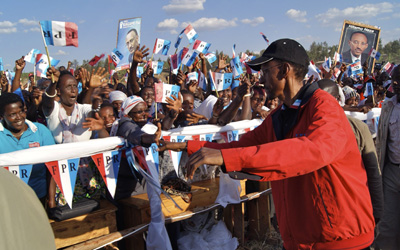“No one but you!” supporters of President Paul Kagame have shouted at recent election rallies with many waving the red, white, and blue flags that symbolize the ruling Rwandan Patriotic Front party, according to local and international reports. But journalists critical of the ruling party could not document firsthand the campaign that ended today because the government systematically shut their news outlets and swept them out of the country in a campaign of intimidation.
Heading into today’s vote, Kagame was virtually certain to win another seven-year term. He faced no credible challengers–two opposition parties were banned–and critical domestic news coverage had been quashed.
In April, the government-influenced Media High Council issued a six-month suspension to two critical weeklies, Umuvugizi and Umuseso, for purportedly inciting violence and criticizing the head of state. Chief Editor John-Bosco Gasasira of Umuvugizi told me he fled the country the same month after encountering threatening phone calls and surveillance from military intelligence. In May, the managing director of Umuseso Didas Gasana also fled the country fearing impending arrest. “It was getting tougher to bear,” Gasana told me. “As things appear now, the country has become practically impossible for any critic or any opposition.” Both publications launched websites to circumvent state censorship, but within weeks both sites were blocked within the country.
For many weeks, Gasasira remained defiant that his news outlet would continue its work in the country. “Jean-Leonard Rugambage is my deputy and he is going to continue operations of the paper,” he told CPJ after going in exile. But by June, Rugambage was shot dead as he entered the gate of his home. Authorities claimed the killing was retaliation for Rugambage’s alleged involvement in the 1994 genocide–a charge the government has not supported with evidence. Rugambage’s wife, Epiphanie, felt compelled to flee Rwanda with her 2-year-old child after plainclothes agents interrogated her, Gasasira said.
Exiled journalists from Umuseso launched a new weekly, Newsline, and tried to ship the paper by bus into Rwanda in late June. “We put someone on the border to pick up the copies,” Gasana told CPJ, but police confiscated the paper, briefly detained the bus driver, and imprisoned the conductor for four days. “I felt terrible,” Gasana said. “He was just a bus conductor with no ties to our paper. We had no idea they would react in such a way.”
Despite all this, both publications are still covering Rwndan politics, albeit from afar and without deep domestic readership. “Even if you can only manage to reach one person, it’s worth it since they might pass the information on to someone else,” Gasana said. But reporting from exile is challenging for both publications since sources fear speaking with them. “Our sources are so intimidated that it proves challenging to cross-check information, especially after the assassination of Rugambage. This has really terrified both reporters and sources alike,” Gasasira told me.
Police arrested the editor of another critical paper, Umurabyo, in July, a month prior to the polling. Editor Agnès Uwimana and colleague Saidati Mukakibibi were charged with a volley of criminal charges including inciting violence through malicious propaganda and denial of the 1994 genocide, local journalists told CPJ.
With few critical voices left in operation, one wonders whether the electoral coverage could be thorough and impartial. The Media High Council Executive Secretary Patrice Mulama told me that both private and public media had done a decent job of covering the four presidential candidates. The council opened a press center in Kigali to assist reporters with election coverage and ferried journalists to remote rural polling stations.
But the kicker, Gasana pointed out, lies with the candidates themselves. All of the presidential candidates who were left in the running have links to the ruling party, the BBC reported. “Of course [the media] can cover all of the candidates without losing favor with Kagame since none of them are genuine contenders,” one local journalist told me. Fearing for his safety, he spoke on condition of anonymity.
The targeting of journalists and opposition candidates has led to considerable criticism of Kagame in international media. “Kagame allows less political space and press freedom at home than Robert Mugabe does in Zimbabwe,” The Economist charged recently.
The exiled Rwandan press, in fact, does seem to be acting similarly to their exiled Zimbabwean colleagues. “The Zimbabwean exiled media is the most dynamic, active press on the continent,” the Federation of African Journalists President Omar Faruk told me recently at his office in Nairobi. Exiled Zimbabwean radio stations and newspapers such as SW Radio and The Zimbabwean have gradually taken over both readership and the news agenda from the state-run press. If the space for free expression closes further in Rwanda after the polls, a similar scenario could take place. In the meantime, Newsline is readying a special election edition, Gasana says.
